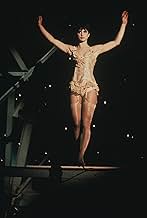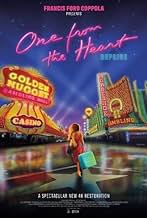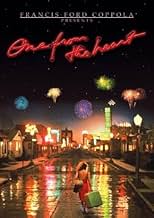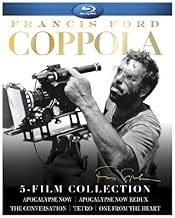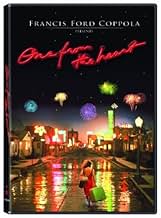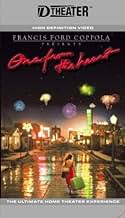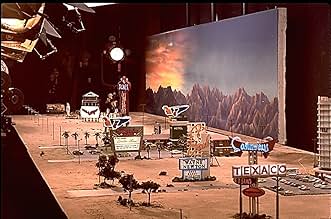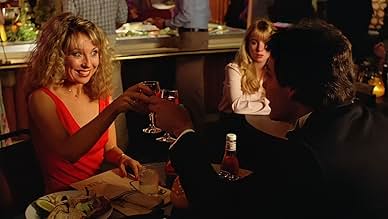VALUTAZIONE IMDb
6,5/10
8713
LA TUA VALUTAZIONE
Una coppia litiga dopo aver vissuto insieme per 5 anni a Las Vegas. Escono e festeggiano il 4 luglio, ciascuno con un nuovo partner. Rottura?Una coppia litiga dopo aver vissuto insieme per 5 anni a Las Vegas. Escono e festeggiano il 4 luglio, ciascuno con un nuovo partner. Rottura?Una coppia litiga dopo aver vissuto insieme per 5 anni a Las Vegas. Escono e festeggiano il 4 luglio, ciascuno con un nuovo partner. Rottura?
- Regia
- Sceneggiatura
- Star
- Candidato a 1 Oscar
- 2 candidature totali
Nastassja Kinski
- Leila
- (as Nastassia Kinski)
Allen Garfield
- Restaurant Owner
- (as Allen Goorwitz)
Rebecca De Mornay
- Understudy
- (as Rebecca de Mornay)
Judith Burnett
- Eleanore
- (non citato nei titoli originali)
Recensioni in evidenza
I have never been in the United States, least of all in New York. But through some directors' works I have built up an image of the city that never sleeps that's made of jazz, petty crooks and gangsters, Godard-lovers, intellectual wanna-be socialite... For all I know, New York is what can be seen through the eyes of Woody Allen, Martin Scorsese... and Francis Ford Coppola.
I would pretty much compare ONE FROM THE HEART to Allen's MANHATTAN, in the sense that both are new-yorkers visions of romance and beauty, filtered through a broadway theatrical and glamorous sensibility. This film, however, unlike MANHATTAN, isn't about New York. It's about spining through the spotlights of a city that parties all night long (cabarets, jazz, dance and magical flirts), only to realize that in the end, it's going to be your simple significant other waiting for you in the backstage.
The staging of the whole movie helps a lot, in the sense that's it's all filmed in studio. Magical skies and dawns that make it easy to pass from a store-window directly to a sunset in Bora-Bora; lust and life and music in what I would consider the last great musical. Every once in a while, Coppola gives us a glimpse of his more passionate side. This would then be the sunny side of the melancholic DRACULA.
Add to the magical staging the nightly cabaret-like musical score by Tom Waits and Crystal Gayle and one can't help but be amazed with it all. And I thought I was surprised by Woody Allen's EVERYONE SAYS I LOVE YOU.
If this is the way new-yorkers see life, that's the city I want to live in.
I would pretty much compare ONE FROM THE HEART to Allen's MANHATTAN, in the sense that both are new-yorkers visions of romance and beauty, filtered through a broadway theatrical and glamorous sensibility. This film, however, unlike MANHATTAN, isn't about New York. It's about spining through the spotlights of a city that parties all night long (cabarets, jazz, dance and magical flirts), only to realize that in the end, it's going to be your simple significant other waiting for you in the backstage.
The staging of the whole movie helps a lot, in the sense that's it's all filmed in studio. Magical skies and dawns that make it easy to pass from a store-window directly to a sunset in Bora-Bora; lust and life and music in what I would consider the last great musical. Every once in a while, Coppola gives us a glimpse of his more passionate side. This would then be the sunny side of the melancholic DRACULA.
Add to the magical staging the nightly cabaret-like musical score by Tom Waits and Crystal Gayle and one can't help but be amazed with it all. And I thought I was surprised by Woody Allen's EVERYONE SAYS I LOVE YOU.
If this is the way new-yorkers see life, that's the city I want to live in.
I'm somewhat surprised at the number of negative reviews for "One From the Heart," and in particular those from people who had seen the film when it was initially released and have, for some reason, gone back to see the film again on DVD. If said persons were so dissatisfied with the film the first time around, then why would they bother with a second screening? Myself, I first saw Coppola's film when I rented it from Blockbuster some ten years ago, and was thoroughly impressed with a warm tale told in a surreal world. After a ten year search for it on VHS I now finally own a copy of it on DVD.
One of the recurring criticisms with people who've critiqued the film is the choice of actors for the two leads. I imagine said folks would've preferred actors with a higher degree of visual appeal or comeliness, but what those people are missing is the fact that it's the idea of ordinary looking people dealing with very profound issues. It's the fact that everyday looking folks can suffer from problems and take the steps through an emotional story that appeals to the audience. The very same audience who say they would've preferred different actors. It just wouldn't work, and it wouldn't be the film that same audience enjoys. And for the record both Garr and Forest are appealing on their own terms. They're not super models, but have a knack for presenting their characters. This is what good actors do.
The plot is thin, as someone observed. But then again the film's story isn't plot driven. It's a love story about two people who've found one another, but are letting their desires get in the way of their feelings, and the paths they take to satiate those desires. The film begs the question of what rules the characters' hearts. It's a question most married couples (or couples who've lived together for a long time) face at some point. The question may come to a couple in passing as they speculate what life would've been like without their partner, or it may be the cause of a rift, possibly divorce. "One from the Heart" takes that premise and presents it in a stylized format. A format that allows the audience to get lost in a world in which it's far easier and more pleasant to explore that question, than say in a "real world" analog, where the film would've lost its stylized impact. Had "One from the Heart" been shot on location, or otherwise rendered more conventionally, then it would've lost its unique visual charm. The various shots, colors, and other aspects of the film would've been lost, and "One from the Heart" would've been tossed into a sea of other relationship films.
There's criticism of the plot, criticism of the style, the actors, and a number of things that people who saw it in its first release (as well as now) find dissatisfactory. My thoughts; typically when a thing, a really good thing, is the subject of nitpicking it typically means that thing, whatever it is, is really good, but, for whatever reason, people feel the need to take it apart because they don't want to acknowledge its total quality (and perhaps out of jealousy). That's unfortunate, because "One From the Heart" isn't meant to be a traditional film, and it would appear the critics are trying to squeeze out conventionality from a truly original piece of art.
"One from the Heart" tells a story of normal couple facing that point of decision in their lives; will they or won't they stay together? Teri Garr's character wonders if there isn't a life of romantic adventure waiting for her beyond Las Vegas. Frederic Forrest's character wonders if there isn't some young beautiful woman out there who'll fall for him. These are typically the two notions that enter couple's thoughts: Couples that hit a rough spot in their relationship. It's a unique film about ordinary people facing ordinary, yet personally profound, questions.
And that's what "One from the Heart" is all about.
One of the recurring criticisms with people who've critiqued the film is the choice of actors for the two leads. I imagine said folks would've preferred actors with a higher degree of visual appeal or comeliness, but what those people are missing is the fact that it's the idea of ordinary looking people dealing with very profound issues. It's the fact that everyday looking folks can suffer from problems and take the steps through an emotional story that appeals to the audience. The very same audience who say they would've preferred different actors. It just wouldn't work, and it wouldn't be the film that same audience enjoys. And for the record both Garr and Forest are appealing on their own terms. They're not super models, but have a knack for presenting their characters. This is what good actors do.
The plot is thin, as someone observed. But then again the film's story isn't plot driven. It's a love story about two people who've found one another, but are letting their desires get in the way of their feelings, and the paths they take to satiate those desires. The film begs the question of what rules the characters' hearts. It's a question most married couples (or couples who've lived together for a long time) face at some point. The question may come to a couple in passing as they speculate what life would've been like without their partner, or it may be the cause of a rift, possibly divorce. "One from the Heart" takes that premise and presents it in a stylized format. A format that allows the audience to get lost in a world in which it's far easier and more pleasant to explore that question, than say in a "real world" analog, where the film would've lost its stylized impact. Had "One from the Heart" been shot on location, or otherwise rendered more conventionally, then it would've lost its unique visual charm. The various shots, colors, and other aspects of the film would've been lost, and "One from the Heart" would've been tossed into a sea of other relationship films.
There's criticism of the plot, criticism of the style, the actors, and a number of things that people who saw it in its first release (as well as now) find dissatisfactory. My thoughts; typically when a thing, a really good thing, is the subject of nitpicking it typically means that thing, whatever it is, is really good, but, for whatever reason, people feel the need to take it apart because they don't want to acknowledge its total quality (and perhaps out of jealousy). That's unfortunate, because "One From the Heart" isn't meant to be a traditional film, and it would appear the critics are trying to squeeze out conventionality from a truly original piece of art.
"One from the Heart" tells a story of normal couple facing that point of decision in their lives; will they or won't they stay together? Teri Garr's character wonders if there isn't a life of romantic adventure waiting for her beyond Las Vegas. Frederic Forrest's character wonders if there isn't some young beautiful woman out there who'll fall for him. These are typically the two notions that enter couple's thoughts: Couples that hit a rough spot in their relationship. It's a unique film about ordinary people facing ordinary, yet personally profound, questions.
And that's what "One from the Heart" is all about.
Most general accounts of Francis Ford Coppola's work have identified recurrent familial themes, while visually he has come to be understood as something of a guru of the extravagant. However, neither of these positions is entirely sustainable across an oeuvre that on closer inspection discloses considerable formal and thematic scope. If Coppola had by the close of the 1970s figured, understandably enough, that his career was blessed, this, his next venture, would bring about a very hasty and categorical fall from grace. Initially conceived as a modest antidote to the excesses of Apocalypse Now, the project ballooned into an experiment of gargantuan, tragic proportions that subsequently marked an immediate shift in his career to more modest productions.
This Oscar-nominated Vegas-set semi-musical, which led to Coppola's bankruptcy, is an intriguing production but not a good film. From Coppola, the inspired mastermind of The Conversation, Apocalypse Now and the Godfather films, it's a foremost letdown. A movie's innovative technical process is indeterminate. Movies make or break as per the substance of their material. The most miserable thing about this lavish exercise in style is that it has none. It's a tango of elegant and byzantine camera movements filling wonderful sets, and the characters get completely misplaced in the thick. There's never a second in this film when I'm concerned about what's happening to the people in it, and but one moment, a cameo by Allen Goorwitz as a furious coffee shop owner, when I feel that an actor's artlessness successfully slips past Coppola's suffocating panache and into the audience.
The raconteur of The Godfather turns into a pure technician here. There are unsettling congruences between Coppola's fanatical command of this film and the character of Harry Caul, the wiretapper in Coppola's The Conversation, who cared solely about technical outcomes and declined to let himself consider human ones. Movies are innumerable different things, but most of the best ones are about and for people, and this unmistakably hallucinatory and dreamlike piece of filmmaking takes little notice of the difficulties of the human spirit. Certainly, it appears virtually on the lookout against the actors who inhabit its painstakingly designed scenes. They're scarcely ever permitted to lead. They're figures in a larger blueprint, one that ebbs them, that views them as part of the furnishings. They aren't offered many close-ups. They're frequently suffused in loud red glimmering or overpowering blues and greens. They're positioned before off-puttingly glitzy sets or adrift shoddily stage-managed hordes. And occasionally they're interrupted at the heart of a sentiment because the uncompromisingly planned camera has affairs elsewhere.
I've forgotten, indeed, to mention the players, or who they play. That's not so much of an omission talking about a film like this. The two leads, the sexier-than-ever Teri Garr and the forgettable-as-ever Frederic Forrest occupy a Las Vegas of regret, languor, and glitzy lights. For a short time, they spring from their monotonous lives and meet new lovers, Raul Julia and Natassja Kinski, who string them along with flights of the imagination. In effect, Coppola's telling the simple story of a break-up but with the hyper-romantic lusciousness of the emotions we feel in those times, which is cool, until it becomes an unmotivated, auto-pilot story upstaged by its own, well, stages.
There are trivial amusements in this movie. One is Harry Dean Stanton's phone-in as a sleazy junkyard owner, while Coppola defies showing us Stanton's most valuable instrument, his telling eyes. Kinski, as a circus tightrope walker, has a pretty decent blip on the radar when she explains "to make a circus girl disappear, all you have to do is blink." Garr is endearing, but her role makes her unrewardingly submissive, and Forrest is more or less transparent here, playing such a nonentity. Ho hum.
This Oscar-nominated Vegas-set semi-musical, which led to Coppola's bankruptcy, is an intriguing production but not a good film. From Coppola, the inspired mastermind of The Conversation, Apocalypse Now and the Godfather films, it's a foremost letdown. A movie's innovative technical process is indeterminate. Movies make or break as per the substance of their material. The most miserable thing about this lavish exercise in style is that it has none. It's a tango of elegant and byzantine camera movements filling wonderful sets, and the characters get completely misplaced in the thick. There's never a second in this film when I'm concerned about what's happening to the people in it, and but one moment, a cameo by Allen Goorwitz as a furious coffee shop owner, when I feel that an actor's artlessness successfully slips past Coppola's suffocating panache and into the audience.
The raconteur of The Godfather turns into a pure technician here. There are unsettling congruences between Coppola's fanatical command of this film and the character of Harry Caul, the wiretapper in Coppola's The Conversation, who cared solely about technical outcomes and declined to let himself consider human ones. Movies are innumerable different things, but most of the best ones are about and for people, and this unmistakably hallucinatory and dreamlike piece of filmmaking takes little notice of the difficulties of the human spirit. Certainly, it appears virtually on the lookout against the actors who inhabit its painstakingly designed scenes. They're scarcely ever permitted to lead. They're figures in a larger blueprint, one that ebbs them, that views them as part of the furnishings. They aren't offered many close-ups. They're frequently suffused in loud red glimmering or overpowering blues and greens. They're positioned before off-puttingly glitzy sets or adrift shoddily stage-managed hordes. And occasionally they're interrupted at the heart of a sentiment because the uncompromisingly planned camera has affairs elsewhere.
I've forgotten, indeed, to mention the players, or who they play. That's not so much of an omission talking about a film like this. The two leads, the sexier-than-ever Teri Garr and the forgettable-as-ever Frederic Forrest occupy a Las Vegas of regret, languor, and glitzy lights. For a short time, they spring from their monotonous lives and meet new lovers, Raul Julia and Natassja Kinski, who string them along with flights of the imagination. In effect, Coppola's telling the simple story of a break-up but with the hyper-romantic lusciousness of the emotions we feel in those times, which is cool, until it becomes an unmotivated, auto-pilot story upstaged by its own, well, stages.
There are trivial amusements in this movie. One is Harry Dean Stanton's phone-in as a sleazy junkyard owner, while Coppola defies showing us Stanton's most valuable instrument, his telling eyes. Kinski, as a circus tightrope walker, has a pretty decent blip on the radar when she explains "to make a circus girl disappear, all you have to do is blink." Garr is endearing, but her role makes her unrewardingly submissive, and Forrest is more or less transparent here, playing such a nonentity. Ho hum.
Many film fans are keenly aware of the circumstances surrounding Francis Coppola's "One From the Heart." It was the first film to launch his self financed Zoetrope Studios. He recruited many of the industries best and brightest for the production. It was Coppola's follow up to the legendary "Apocalypse Now." The film was supposed to mark a new direction for filmmaking as a whole. Zoetrope was to be a place where directors and storytellers could produce their films without studio interference. The artists would control the medium, not the business men. And with "One From the Heart", Coppola's dream came to a thundering halt after just one movie. Though not as well known, it stands along side "Heaven's Gate" as a film that proved that the wonder directors of the 70's would not be given the keys to the castle. "Heart" was that once in a decade disaster and it's not hard to see why it was such an ignored film. It turns out that this story behind the film is far more interesting to follow than the film itself.
"One From the Heart" is as stylized as films can come. Shot entirely on the sets at Zoetrope, "Heart" attempts to tell the story of Franny and Hank, a long together couple possibly nearing the end of their rope with one another. The couple calls it quits and they seek solitude in the arms of more adventuresome lovers for one night in an entirely reproduced Las Vegas. Coppola's decision to cast Frederic Forest and Teri Garr seems daring at first, almost brave. But casting two such down to Earth actors against the overwhelming design of "One From the Heart" leaves the two with nothing to do but drown under the neon cinematography. Garr and Forest give it a go, but their problems seem minor against the wave of the film itself. It's possible no two actors could've asserted themselves against this backdrop. Coppola has infused every shot in "Heart" with enough technique and design that he seems to have completely forgotten to add any element of genuine drama into the proceedings. The story never moves far beyond the 'will they stay together or break up' arc. It isn't without possibility, but it's more suited to a smaller more intimate scale, not the phantasmagoric, neon coated reality that constantly draws attention to itself that Coppola labors to construct. All the design is admirable and on occasion very gorgeous. But it won't take an astute viewer very long to see that "One From the Heart" is a film more intended to be looked at than actually watched. A technological achievement in filmmaking? Yes. A genuinely involving film? No.
Despite disliking the film I'm glad to see it's finally available on DVD in a watchable format. Viewers can finally see this much maligned film for themselves and decide about its merits. The film is also noted for it's songs and score by Tom Waits and Crystal Gail.
"One From the Heart" is as stylized as films can come. Shot entirely on the sets at Zoetrope, "Heart" attempts to tell the story of Franny and Hank, a long together couple possibly nearing the end of their rope with one another. The couple calls it quits and they seek solitude in the arms of more adventuresome lovers for one night in an entirely reproduced Las Vegas. Coppola's decision to cast Frederic Forest and Teri Garr seems daring at first, almost brave. But casting two such down to Earth actors against the overwhelming design of "One From the Heart" leaves the two with nothing to do but drown under the neon cinematography. Garr and Forest give it a go, but their problems seem minor against the wave of the film itself. It's possible no two actors could've asserted themselves against this backdrop. Coppola has infused every shot in "Heart" with enough technique and design that he seems to have completely forgotten to add any element of genuine drama into the proceedings. The story never moves far beyond the 'will they stay together or break up' arc. It isn't without possibility, but it's more suited to a smaller more intimate scale, not the phantasmagoric, neon coated reality that constantly draws attention to itself that Coppola labors to construct. All the design is admirable and on occasion very gorgeous. But it won't take an astute viewer very long to see that "One From the Heart" is a film more intended to be looked at than actually watched. A technological achievement in filmmaking? Yes. A genuinely involving film? No.
Despite disliking the film I'm glad to see it's finally available on DVD in a watchable format. Viewers can finally see this much maligned film for themselves and decide about its merits. The film is also noted for it's songs and score by Tom Waits and Crystal Gail.
When I went to see this movie I didn't expect much of it, but I was wrong. What we have here is a very good Francis Coppola's reinvention of a musical made in 1982. A beautifully filmed and well acted romantic film with wonderful music score and songs from Tom Waits, who was then nominated for Oscars in the Best Song category for this picture. "One from the Heart" was entirely filmed on Coppola's Zoetrope Studios, what brings to memory great movies of the Hollywood Studio Era. It really contributes perfectly to create "dreamy" mood of the film, it feels like a dream wondering through studio night Las Vegas probably as false as the real Las Vegas itself. And on this background we have a very simple and sweet romantic story of a love crisis in a relationship of a simple American couple wonderfully played by Terri Garr and Frederic Forrest. Perhaps it´s a kind of movie that you either love or hate. I loved it. 9/10
Lo sapevi?
- QuizOriginally intended as a small film after the enormous cost, pressures, and production problems of Apocalypse Now (1979), this film's budget ballooned from $2 million to over $25 million. The extraordinary costs led to director Francis Ford Coppola declaring bankruptcy. Coppola has stated that the films he made were done to pay off the debts incurred producing this film.
- BlooperWhen Hank removes Frannie from Ray's room, Ray puts on a robe, and he is not wearing any underwear. However, after Ray yells at Hank from the balcony, his robe falls open, and he is shown wearing jockey shorts.
- Curiosità sui creditiIn the opening credits, the names of crew members appear in the neon signs of Vegas casinos and hotels.
- Versioni alternativeThree versions exist. The theatrical version; 103 minutes The restored version, release in 2003; 99 minutes Reprise version, release in 2023; 93 minutes The story is generally the same. But they have many changes, cut or altered shot.
I più visti
Accedi per valutare e creare un elenco di titoli salvati per ottenere consigli personalizzati
- How long is One from the Heart?Powered by Alexa
Dettagli
- Data di uscita
- Paese di origine
- Sito ufficiale
- Lingue
- Celebre anche come
- Una del corazón
- Luoghi delle riprese
- Azienda produttrice
- Vedi altri crediti dell’azienda su IMDbPro
Botteghino
- Budget
- 26.000.000 USD (previsto)
- Lordo Stati Uniti e Canada
- 697.872 USD
- Fine settimana di apertura Stati Uniti e Canada
- 389.249 USD
- 14 feb 1982
- Lordo in tutto il mondo
- 719.534 USD
- Tempo di esecuzione
- 1h 47min(107 min)
- Colore
- Proporzioni
- 1.37 : 1
Contribuisci a questa pagina
Suggerisci una modifica o aggiungi i contenuti mancanti



